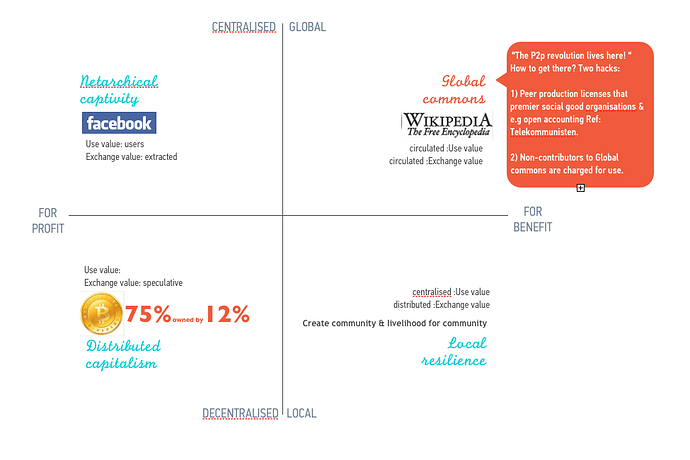Dear Michel,
it was a pleasure meeting you at Ouishare fest, a fun gathering of various actors in the so-called Collaborative Consumption/ “sharing” /“New Economy” movement.
Sharing, it seems, is growing: the revenue flowing through the share economy directly into people’s wallets will surpass $3.5 billion this year, with growth exceeding 25%. Airbnb alone has housed over 4 million individuals since 2008, 2.5 million of which took place in in 2012 alone [Ref]. As pointed out in this presentation by Loic Lemur, there are many reasons for the sudden surge of interest incuding the ongoing economic crisis.
Technosocial changes bring about new landscapes of opportunities and pitfalls. There are many questions to be answered with regards to the sharing economy. I enjoyed your keynote presentation as it is making a needed contribution towards clearing some of the confusion about how different entities are currently participating in the sharing economy. As well as why interaction between them is sometimes problematic. You presented a sketch of four prospective scenarios of p2p dynamics, that taken together would give an overview of what is going on in the the so called sharing economy (please correct me if I got any of it wrong)
You pointed out that it is not whether the entitiy is run for profit or for benefit, or whether it is managed in a centralised or decentralised manner per se that positions it as contributing to the common good, or not. In order to understand how actors are participating in the sharing economy, you made a point that one needs to determine whether they lead to use and exchange value being circulated, distributed and or extracted. Of the questions facing the sharing economy, how to balance making meaning and the need to make money is perhaps the deepest. In my own keynote about the unMonastery I asked why so many sharers are struggling if sharing is so good?
Did you imply a path to improve the situation is to think beyond creating livelihoods for local communities and rather in terms of achievieving economic democracy in terms of contribution to, and extraction of value from global commons? Am I correct in understanding you would like to see a situation where both use and exchange value are circulated? If I understood correctly, you propose that this can be achieved through peer production licenses that premier ethical organisations and people (those who contribute to global commons) and charge those who extract value without sufficiently contributing to it.
I think I followed till the point where you mentioned both Transition Towns and Wikipedia as examples, pointing out that while Wikipedia can be considered global commons (even though you think it’s governance is flawed as those who know the rules have more power than those who know the subject). Because you include both wikipedia and transition towns as examples, I do not understand the differences between what you refer to as global commons and public goods. Some goods like the air, can be used by one person without this meaning less of it is available for others to use: they are non-rivalrous. Also, you couldn’t really stop others from accessing them: they are effectively non-excludable. These are public goods. Common goods, on the other hand like, rivers from which fish are sourced, are rivalrous and non-excludable. I guess Wikipedia by virtue of being information (non-rivalrous non-excludable) could be considered public goods.
When you put a price on public goods you are destroying wealth (if you think of it as an outcome of human activity). If you raise the price on something people will use less of it, and in the case of immaterial goods they will produce less of it as a result. Wouldn’t the p2p license idea imply that you would need to police digital commons so as to create artifical scarcity, which would in turn be destructive?
Am I missing something important here? I am trying to get my head around these topics and would very much appreciate help in figuring this out!
thanks again, Nadia
Photo credit for Image of Michel Bauwens presenting during Ouishare: Gayane Adourian
